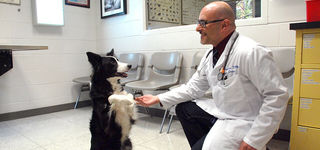Anger
Dogs and Humans Have Similar Social and Emotional Brains
But dogs struggle the most in a society that they do not always understand.
Posted June 18, 2018
TGIF (Thank Goodness It’s Friday)! Even better, it’s Friday night! After a week of trying to appease your boss at work in order to bring home your much-needed paycheck, it is finally time to retreat to the safest and sweetest of all places: your home. First, you stop by your favorite Neapolitan pizza place to get the most delicious Margherita Pie for carry-out. At home, you get comfortable, grab a cold beer, and sit down to devour your pizza (while watching The Americans season finale together with your best buddy, your dog; can it get better than this?).
But, suddenly, there is a knock at the door. It is your boss, with his usual friendly assertiveness! He sits at your table, pours some of your beer into a glass and starts devouring your pizza. You watch in disbelief! But he is your boss in the end and you don’t want to lose your job. So, you swallow your pride and anger and don’t say anything. What a stressful Friday night! Your safe haven has been invaded and your beloved pizza has been stolen (and you don’t even know how The Americans ended; can it get worse than this?).
Unfortunately, the nightmare is not over that night. He knocks on the door again a few weeks later! Same scenario, same upset. This time you voice your disappointment, but at a mumble which he probably does not hear. Then it happens a third time, just one week later. This time you really lose your temper – you shout at him and emphatically kick him out of your home. Well done, right? Sure, he is your boss and you have to listen to him at work, where he has authority because social rules say so. But at your home you are the only boss!
But, wait a minute. Can you please explain why you complain about your dog growling when you take his food away? No, “my dog loves me, but I don’t love my boss” is not the right answer. What would you do if your partner, whom you love very much, ate your share of the pizza every night? Would he/she be able to get away with an “Oh, I love you”? Probably not. At work or home, we develop social bonds of a different nature and we struggle to respect social rules to keep a peaceful and stable environment. Nevertheless, we are not willing to accept any challenge or threat from our mates in the name of love or hierarchy. The acceptance of social rules may be dependent on the context in which an interaction occurs. This is why you may be willing to follow your boss’ directions about work-related matters, but not about your private life. Conversely, if you are an orthopedic surgeon married to an attorney, you may not be willing to follow your wife’s directions on how to fix a fracture no matter how much you love her.
Your beloved dog may do everything you ask of him during a training class, but then bark and growl when you try to push him off the couch at home. Don’t take it personally; he is not trying to rule the house. He is just trying to make it clear that he does not like to be pushed off when he is resting (who does?). Dogs experience the same struggle between social bonds and conflict, with some additional difficulties. The dog brain has a better-developed cerebral cortex than do many comparable small animals (such as cats!), which allows dogs to express complex social behavior with their own kind and humans. However, the canine cortex still pales in comparison to the richness of the human brain cortex. Our brains make it possible for us to live in high-density cities with minimal conflicts, to adapt to a variety of very different environments, and to share deeply complex thoughts in words.
But we all know that human relationships are not all and only about love and being social. Even though we are the most evolved social species on Planet Earth, we still need our safe spaces, resources and personal safety. When we feel that these are challenged or threatened, stress, fear, and anxiety take over. Sometimes we even become aggressive. The part of the brain that is responsible for these emotions, the limbic system, is very similar between humans and dogs. For this reason, it is likely that dogs experience these emotions in the same way we do.
Among many other functions, the cortex is responsible for modulating these emotions and making sure that they don’t take over at the wrong time. This is why we don’t hit the doctor who causes us pain! Having a more developed cortex, humans have better control of their emotions than do dogs. The bigger cortex also confers more sophisticated language to humans and a better ability to mediate conflicts.
All of this can explain why dogs struggle more than people to keep peace and harmony between themselves and the humans in their lives. They are attached to humans and willing to share their lives, but they want to feel safe in an environment that is almost entirely controlled by humans. Therefore, we should not be surprised if a dog growls at his caregiver when his food is taken away. This dog is not trying to dominate the world or betray the person who feeds him. Rather, he is just making sure that he can eat his food in peace. It is the responsibility of the individual with the bigger and more developed brain to ensure that this happens without an emotional meltdown, whether the individual with a less developed brain is a dog or a child (a.k.a. human puppy).
I often recommend that my students and clients turn on their TVs and listen to the news. They can hear how frequently fear, anxiety and aggression prevail in the social behavior of humans. If we, the smart creatures, are not able to create a world of sustained peace, why don’t we tolerate even a growly “no” from our dogs?
A similar brain also means sharing similar behavior problems. Social relationships can be a source of stress, anxiety and fear for humans and dogs. A very strong social bond can cause separation anxiety, as happens in both children and dogs. Social conflicts with other individuals can trigger compulsive behaviors and self-mutilation, or anger and impulsive aggression. Abusive relationships can provoke permanent damage in social behavior and emotions, with a persistent negative emotional state, detachment and inability to experience positive emotions. In fact, a PSTD-like disorder has been identified in dogs.
In conclusion, understanding that we share our sociability and emotions with dogs can help us develop a better sense of empathy for them. Being human is not easy, and neither is being a dog. Because we have the greatest cognitive abilities and have decided to make dogs part of our human-controlled world, it is our moral duty to be sensitive to their needs, and to care for their emotional welfare as well as their health.

Carlo Siracusa, DVM, MS, PhD, DACVB, DECAWBM
Animal Behavior Service, School of Veterinary Medicine, University of Pennsylvania
Philadelphia, PA 19104




